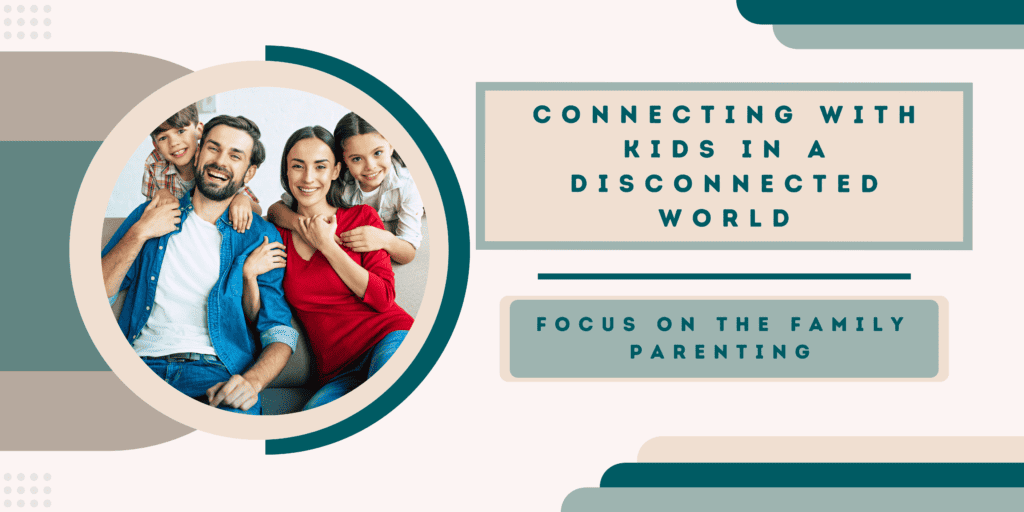
Tech Trends: AI Cheating, ‘Dumb Phones’ and Teen Slang
This month: how to stop your child from using AI to cheat, why dumb phones might be a smart screen-time solution, and a list of tween and teen slang

What does it mean to live in a disconnected world? There are dramatic implications for kids of all ages. Fortunately, you can foster positive connection with your kids through these tips and strategies.
One of the biggest challenges facing families is the disconnected world right under our noses. Never before has the world been so digitally connected yet so humanly detached. Connecting with kids in a disconnected world has never been more important than it is right now.
Children and parents are often far-removed from one another, but the good news is that it doesn’t have to stay that way. As parents, you have the perfect opportunity to deepen your relationships with your children.
The definition of “Disconnection” is “the state of isolation or detachment.” When I became a mom, I decided that I would intentionally connect and build a relationship with my children all through their growing up years. Even more, I desperately prayed that my children would be friends as well.
Our children are hardwired for connection. In fact, every single human being, whether young or old, need meaningful connections for emotional, mental and physical well-being. It is simply how God made us. He placed deep within humanity the need for relationships.
As children, we naturally look for ways to make connections. These connections help us learn about the world around us. We touch, observe, ask hundreds of questions, curiously exploring what we see. With these connections, we create neurological pathways. And it is these links that bring us together.
The different ages and stages of childhood require different tactics. And in this disconnected world, we have to be even more intentional to engage in meaningful interactions with our teens.
With toddlers in tow, it’s easy to play and interact with them. Take time to play purposefully with your children. Engage in messy play, dance, and make memories. To this day, my children remember baking gingerbread cookies with me during the month of December, and it began when they were toddlers. This sets the foundation for years to come.
It all adds up: the language you use in your home, the prayers, games, and interactions all count.
When your kids reach preschool or the first years of elementary, their personalities begin to shine through more and more. This is a wonderful opportunity to begin to connect with your kids before they become too entrenched in a disconnected world. Look for ways that you can connect with your children through art, crafts, and creating things in your home.
If you have a particularly creative child, consider creating an art journal journal together. You can go the traditional art journal route or change things up and have a journal that you pass back and forth throughout the week. For older kids in this age and stage, consider introducing them to knitting, sewing, or needle-point.
When your children enter the middle school years and puberty becomes a reality, the dynamics begin to change. I realized that I had to adapt in the way I related to my teens, not the other way around. There were many times when I knew I needed to spend time seeking God’s heart and clarity on how to connect with my son and daughter.
Intentional parenting and connecting with your kids go together. Parenting with a plan means that you prioritize where you put your time and energy. Those priorities then guide your day-to-day decision-making and commitments. And in this case, it’s fighting against the disconnected reality by building meaningful connections with your children.
First off, parent with the end in mind. Take time to think and pray about long-term outcomes. But also consider what positive changes you want to see in your family during this next year. It could be more laughter, meaningful conversations around the table, engaging outings together, and deeper relationships.
Once you and your spouse come to agreement on the goals, then clearly share your vision with your children. You could say something like, “I want us to have some fun this next week together as a family and build on our relationships. What do you want to do?” Yes, they might groan or roll their eyes, but deep down, your children desire your love.
Thirdly, understand what’s happening in the world right now. Children naturally have keen discernment and will notice your attitudes. When you cultivate a culture of trust, honor, and joy in your home, then they will be open to conversations about life and the world. These moments all add up treasured memories for years to come.
Fourth, make sure that you remain adaptable and self-aware. Let your children set the pace if doing family activities together is something new. Start off with easy wins such as cooking a meal together or cleaning your home with everyone involved.
Who and what we are teaches our children more than what we say. If we want our children to connect with us, then we begin the journey first by taking that initial step.
Focus on connecting with your children this season and see your relationship with them grow by trying a few of the ideas mentioned below:
1. Slow down long enough to listen to your children. Be present. Show up 100% by paying attention to when you are only half-present with your children.
2. Put devices away for an agreed time. Turn off technology when you are focusing on being with your child. Whether they are 2 or 20, they need your undivided attention.
3. Surprise them with quality time. We recently told our children that we have an evening planned for them and that they need to be ready at 6:30 pm. No other information was given. And it’s a joy to see them become curious about our family activity.
4. Pray together.
5. Serve together. Consider finding a place where you could volunteer as a family.
6. Ask for ideas. When your children are involved in the planning, there’s a greater chance for engagement.
7. Cook together. Laugh, play music and dance around the kitchen and experiment with a new meal.
8. Create family rituals. For example, when we are away on vacation together, we normally go for a family morning swim. It’s not an option, and we began this ritual when our children were toddlers, now in their late teens, they even tell their friends that this is what is expected. It’s fun and light-hearted.
9. Aim for 10-15 hugs or touches a day – As family therapist Virginia Satir famously said, “We need four hugs a day for survival. We need eight hugs a day for maintenance. We need 12 hugs a day for growth.”
10. Make time for one-on-one moments. Plan ‘dates’ with your children. I took my daughter to the beach recently, just her and I. At one point, she turned to me and said, “Aaah Mom, we finally have our mother-daughter date. We swam, both read a book lying on the beach with our phones packed it away.” Parents, be creative and consider the age of your children when scheduling those specific one-on-one moments.
Finally, connect with your children by loving them well. Love heals, restores, empowers and encourages. John 13:34 reads, “A new command I give you: Love one another. As I have loved you, so you must love one another. May your family continue to develop a culture focused on deep love, connection, joy and peace.